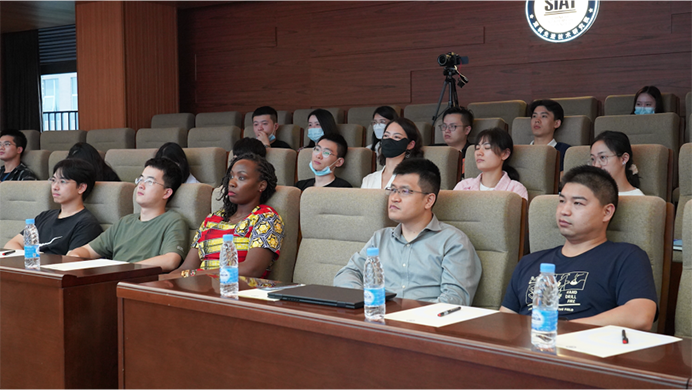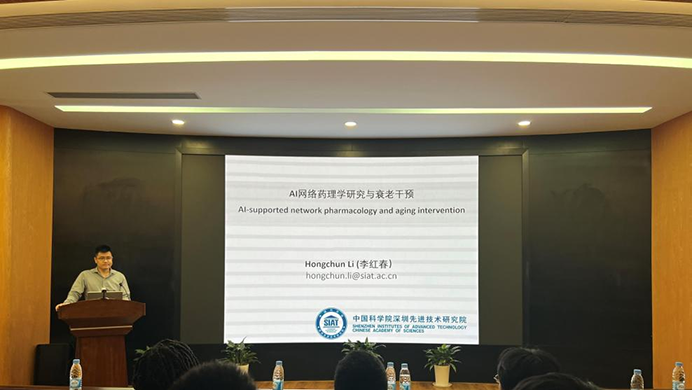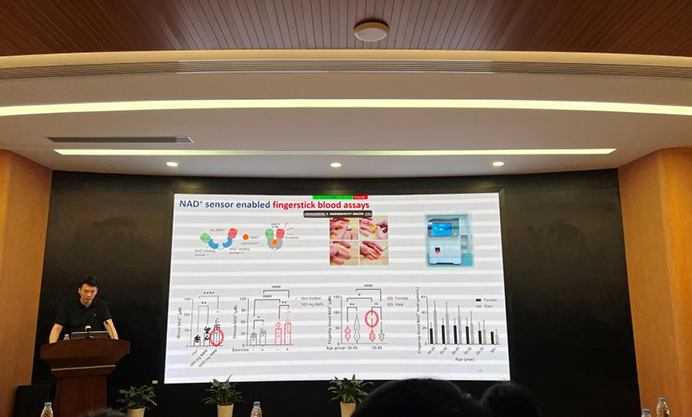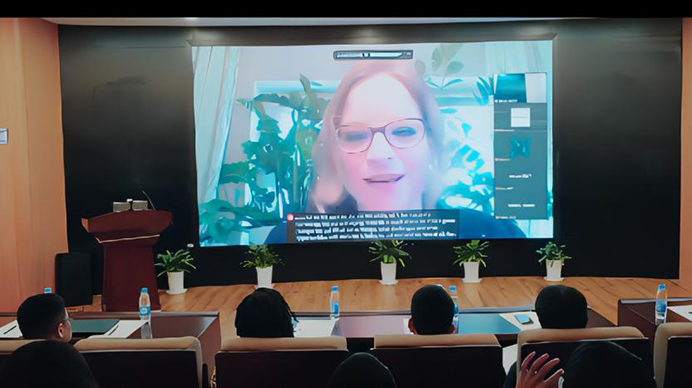On April 25th, 2023, the inaugural International Scientific Symposium on “AI-powered Multi-targeted Anti-aging Research and Application” successfully took place. The symposium was under the auspices of the CNHFA, Shenzhen Science and Technology Association, and the Joint Party Committee of Shenzhen Health Industry Association. It was organized by the Shenzhen Health Industry Development Promotion Association, Shenzhen Health Care Association, CAS-Celfull Mitochondrial Medicine (Shenzhen) Co., and co-organized by the "Sci-Tech China" Shenzhen Life and Science Technology Service Group. The Shenzhen Institute of Advanced Technology provided valuable support for this event. With the overarching goal of "AI-enabled innovation, technology-driven breakthroughs," the symposium invited global experts and scholars to engage in forward-thinking scientific discourse on interventions related to aging, a pertinent topic in an aging society.
During the conference, Li Liangqiu, Executive Vice President of the CNHFA, delivered an insightful opening speech. She emphasized that the pandemic has heightened people's focus on health like never before. Given the current global aging trends, digital transformation plays a pivotal role in advancing the health food industry. This online symposium serves as an academic research platform, fostering collaborative exploration of digitalization in academic research. The exchange of ideas and dialogue between Chinese and international scientists will undoubtedly facilitate the pursuit of health for all humanity.

Speech by CNHFA Executive Vice President Li Liangqiu
Distinguished experts in the field of anti-aging, both domestic and international, were graciously invited to deliver keynote speeches during the symposium. These experts shared their invaluable experiences regarding the latest advancements in AI and aging intervention. The primary objectives were to explore novel applications and technologies of AI in anti-aging research and to address the existing bottlenecks in this domain through the utilization of AI technology.

Li Hongchun, Director of the Celfull AI Multi-Targeted Anti-Aging Institute, imparted his expertise on AI-powered multi-targeted drug development and its applications in anti-aging. He presented insights on how deep learning algorithms can effectively analyze and extract valuable information from extensive datasets encompassing genes, proteins, and metabolites. This enables the discovery of molecular mechanisms and potential drug targets associated with aging. Such advancements play a pivotal role in drug development, treating age-related diseases, and offering more precise and efficient drug screening methods to counteract the aging process.

Professor Julien Hiblot, Group Leader at the Max Planck Institute for Medical Research in Germany, delivered an enlightening presentation regarding the development of metabolic characterization tools for nicotinamide adenine dinucleotide+ (NAD+). His talk highlighted the role of these tools in accessing additional data, thus overcoming bottlenecks in AI-driven multi-target anti-aging research. Professor Hiblot emphasized that the field of life sciences has witnessed remarkable advancements, resulting in the creation of precise NAD+ metabolic characterization tools capable of labeling specific molecules or cells in vivo or within tissues. This innovative technology holds significant implications for the study of aging and diseases by equipping scientists with additional tools and avenues to explore the intricate mechanisms underlying aging processes and disease development.
Professor Qiu Liyang, Chief Scientist of Celfull (China), delivered an informative presentation on the utilization of NAD+ probe tools in precision aging intervention and NAD+ drug discovery. In his talk, he elucidated the critical role of NAD+ as a significant coenzyme in cellular metabolism and energy production. Professor Qiu highlighted how diminished NAD+ levels are associated with various diseases and the aging process.

Dr. Lucy Njunge, an esteemed biomedical engineering specialist, presented her research findings on the topic of NAD+ metabolic regulation and its relevance to autoimmune diseases, particularly rheumatoid arthritis. Rheumatoid arthritis is a chronic autoimmune condition characterized by joint inflammation, pain, and impaired function. Dr. Njunge's studies have revealed distinct differences in NAD+ metabolism between patients with rheumatoid arthritis and individuals without the condition, suggesting a potential contribution of altered NAD+ metabolism to the development of this disease.

Finally, Elise Parker, Head of Research and Development at the Celfull Institute, emphasized the significance of AI and network pharmacology in the realm of metabolic reprogramming therapies for anti-aging interventions. Elise underscored that AI has the potential to enhance scientists' ability to predict the effects of drugs on the human body with greater accuracy, thereby expediting the development and introduction of novel medications.
In recent years, global aging has emerged as a shared challenge for countries worldwide, leading to a surge in aging-related research. Nonetheless, the aging process is highly intricate, involving numerous biological mechanisms and targets. Effectively studying aging necessitates the integration of multidisciplinary knowledge and techniques. Within this context, AI assumes a vital role by leveraging big data mining and analysis to uncover patterns and correlations. By doing so, AI has the potential to offer novel insights and avenues for aging interventions, providing valuable directions for further exploration.
The symposium serves as a valuable platform for experts and scholars in relevant fields to present their latest research findings, exchange ideas, and deliberate on future research directions. Beyond that, it also offers practical ideas and methods to tackle the challenges posed by the global aging society. By doing so, it stimulates further research endeavors and fosters collaborations aimed at advancing the innovative development of AI technology in healthcare and other domains. Ultimately, these collective efforts contribute to enhancing the health and well-being of humanity, making significant strides towards a better future.

